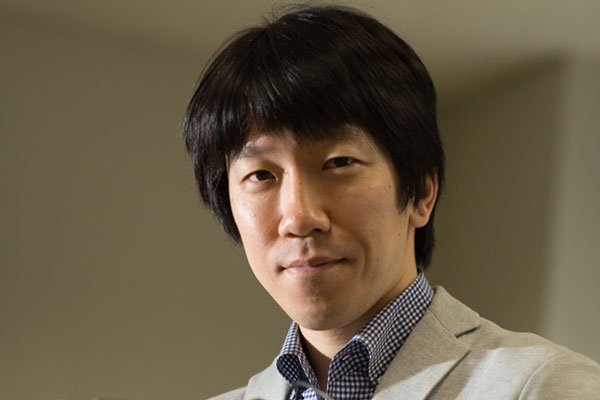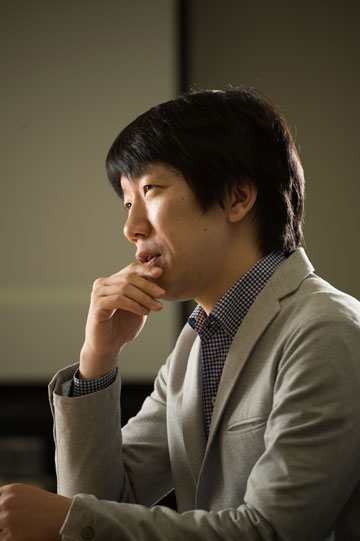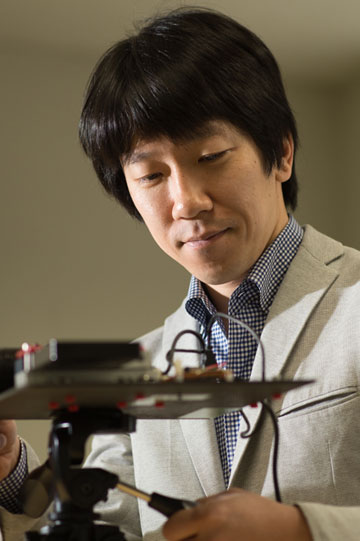
Hiroyuki KUBO
Assistant ProfessorNara Institute of Science and Technology
Interview : Feb. 19, 2018
The limits of physics
 He lived near Ueno Park in Tokyo during his childhood. Every weekend, he had a good time visiting Ueno Zoo or the National Museum of Science and Nature near his house. At the science museum, the dinosaur and linear motor car sections were his favorites. "I had fun running alongside the model car," he says.
He lived near Ueno Park in Tokyo during his childhood. Every weekend, he had a good time visiting Ueno Zoo or the National Museum of Science and Nature near his house. At the science museum, the dinosaur and linear motor car sections were his favorites. "I had fun running alongside the model car," he says.
When he was in high school, he was drawn to the world of physics. "I thought the approach that tries to explain all natural phenomena in a unified manner was so cool. I wanted to study elementary particles and the theory of relativity."
He went on to study in the Department of Physics, School of Science and Engineering at Waseda University. Once he actually started studying physics, however, he began to feel a gap between what he had longed for and what he was doing. Elementary particles were too small to see; in contrast, the universe was too large. He thought he would rather work on phenomena that he could see and feel. At that time, he was also interested in studying the human mind and brain. When he was a senior student, he chose a laboratory that was trying to reproduce human facial expressions using computer graphics (CG).
Skin expressions in CG
 He tried to calculate the conditions in which the human skin let a small amount of light pass through it so that the CG expressions of human skin could be close to the real ones. He also used cameras to measure the material properties of substances.
He tried to calculate the conditions in which the human skin let a small amount of light pass through it so that the CG expressions of human skin could be close to the real ones. He also used cameras to measure the material properties of substances.
What attracts him most in his research activities is that he can become the first person to create an image no one in the world has ever seen by applying camera techniques using new devices or through the development of CG, and witness it himself. The feeling of opening up an unexplored field appeals to him.
The wide range of work researchers can get involved in is also attractive to him. He has done some collaborative studies with people from the game, cosmetics, and filmmaking industries. As he gets along and studies with people from various fields, he can get to know the technical problems they experience in their respective industries. "While things seem to be working well in the world, I can get a glimpse of actual problems behind the scenes. It is a valuable experience. I would be happy if I can be of help to them in solving their problems, even if many of the things I try don't always work out."
For the next generation of students
 He is also interested in student education. His asset is his experience in working for a company for two years after obtaining his doctoral degree. "I could understand, at a surface level, the differences between the principles governing the company and those governing the university, and what sort of education society expects from the universities."
He is also interested in student education. His asset is his experience in working for a company for two years after obtaining his doctoral degree. "I could understand, at a surface level, the differences between the principles governing the company and those governing the university, and what sort of education society expects from the universities."
When he gives advice to students, he does not focus only on solving the problems at hand but always tries to take a broader view. "I am always asking myself if I am giving advice they can apply when they confront new problems after graduation."
He is worried about students’ declining literacy, i.e., the ability not only to read articles about their specialties but also to have a broad knowledge including foreign cultures and histories and the ability to write and explain things in a logical manner.
When he was doing research at Carnegie Mellon University, his Islamic friends made him realize that he knew little about political and cultural situations in other countries. "That experience convinced me that broad literacy is very important, even for scientific researchers, in order to create a relationship of trust in doing collaborative work or research. I would like to let them know those sorts of things as well."
 Home
Home